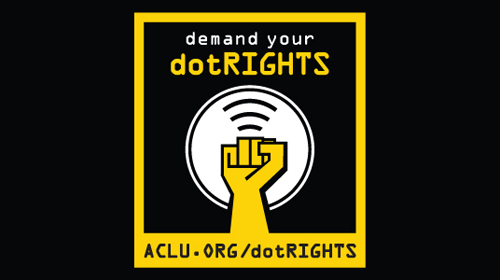
In the digital age that we live in today, we are constantly exposing our personal information online. From using cell phones and GPS devices to online shopping and sending e-mail, the things we do and say online leave behind ever-growing trails of personal information. The └¤░─├┼┐¬Ż▒Żß╣ű believes that Americans shouldnÔÇÖt have to choose between using new technology and keeping control of your private information. Each week, we feature some of the most interesting news related to technology and civil liberties that weÔÇÖve spotted from the previous week.
[Wired ÔÇô Kim Zetter]
"A bill requiring law enforcement agents to obtain a warrant to collect an individualÔÇÖs geolocation data from cellphone carriers would be burdensome to criminal investigators and prevent them from gathering the evidence they need to make a case, according to law enforcement witnesses at a hearing on Thursday."
See Also In Congress Today: Testifying in Support of Geo-Privacy [└¤░─├┼┐¬Ż▒Żß╣ű ÔÇô Catherine Crump]
[ars technica ÔÇô Casey Johnston]
"Twitter will officially support the Do Not Track feature in browsers, Ed Felten, chief technology officer for the Federal Trade Commission, announced on Thursday."
See Also [ZDNet ÔÇô Zack Whittaker]
[MSNBC ÔÇô Bob Sullivan]
"A mother who says her middle-school daughter was forced to let school officials browse the 13-year-old girlÔÇÖs private Facebook page is speaking out against the practice because, she says, 'other parents are scared to talk about it.'"
[ars technica ÔÇô Casey Johnston]
"This implies that, even if you change Facebook's privacy settings since beginning to use a third-party service, or no longer user the service at all, the service may keep your data on hand unless directly asked to delete it."
See Also [Read Write Web ÔÇô Dave Copeland]
See Also [Chris Conley - └¤░─├┼┐¬Ż▒Żß╣ű]
[Consumer Reports]
"We dug into private, academic, and government research, as well as FacebookÔÇÖs labyrinthian policies and controls. And we surveyed 2,002 online households, including 1,340 that are active on Facebook, for our
[Wired ÔÇô Kim Zetter]
"As police departments around the country are increasingly caught up in tussles with members of the public who record their activities, the U.S. Justice Department has come out with a strong statement supporting the First Amendment right of individuals to record police officers in the public discharge of their duties."
Learn more about dotRights: Sign up for breaking news alerts, , and .

